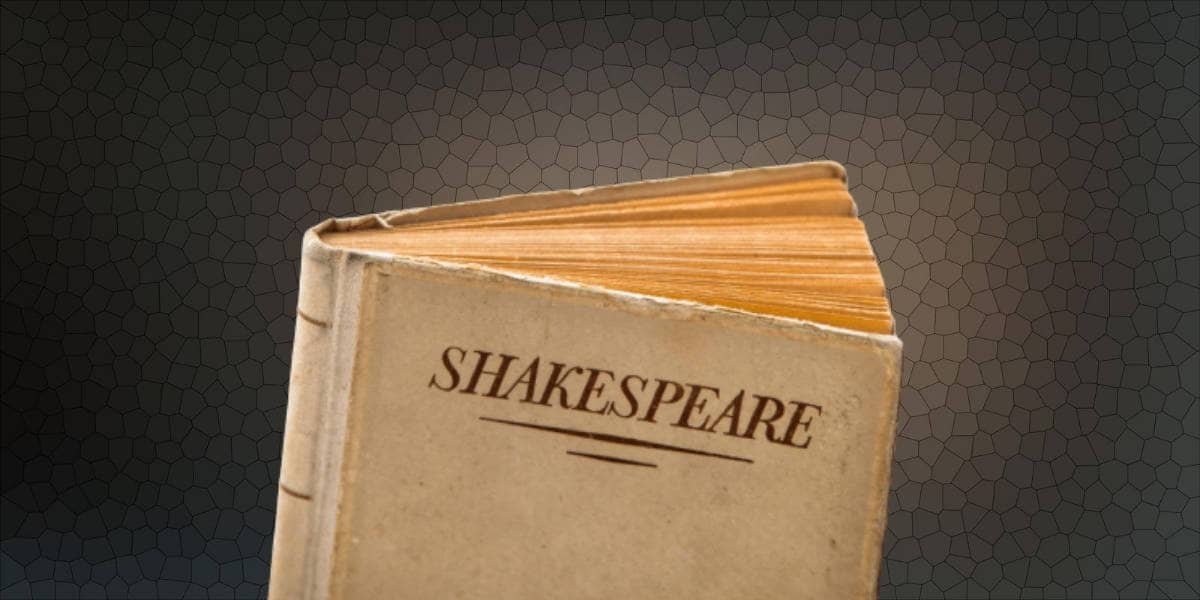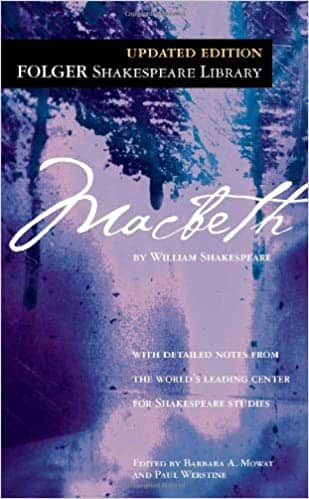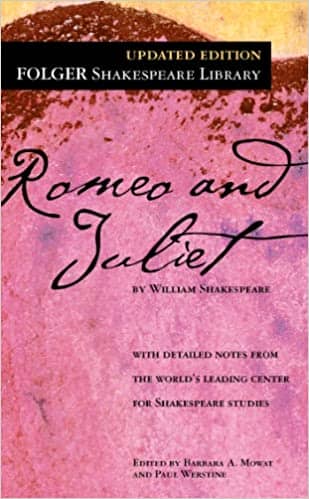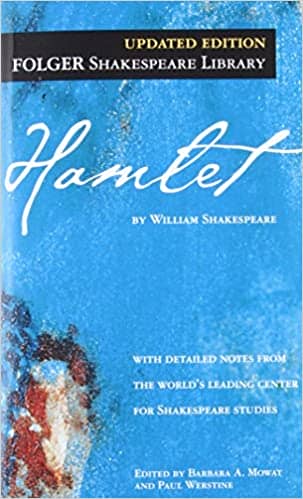The first time you open a book written by Shakespeare you might feel a little lost, but we are sharing some tips on how to read Shakespeare and actually understand it so you can enjoy this literary genius!
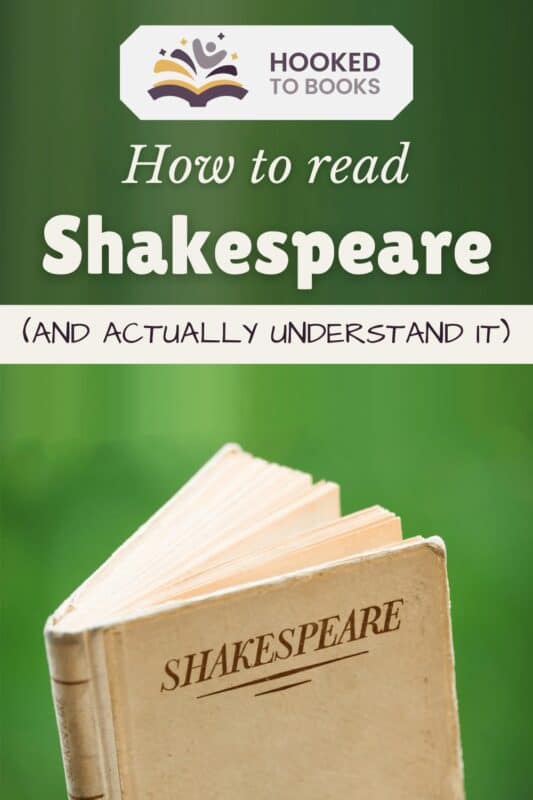
My First Interaction with British Culture
My first real interaction with British culture happened when I was 12 years old.
I remember my brother buying 4 DVDs for a show called “Blackadder”; a pseudo historic sitcom, starring Rowan Atkinson. I was immediately hooked by the dry humor, wordplay, and nuggets of truth sprinkled all over.
My favorite series was #3, set in the late 18th century. In one particular episode, there’s a hilarious scene where two superstitious actors start pinching and hitting themselves, every time someone mentions “the Scottish play”, ie “Macbeth” by Shakespeare.
“Its hot potato, orchestra stalls, puck will make amends”, they screamed every time someone said Macb… I mean, the aforementioned Scottish play!
This little idiosyncrasy was fascinating to me and I wondered if it was true. And to my surprise, it was. The Scottish Curse.
That got me even more interested in the play. I went deep and read more about Shakespeare, quickly realizing how big of an impact he had, something I haven’t noticed in the past.
From writers like Dickens and Faulkner to composers like Tchaikovsky.
Even more, his contributions to the English language are mind-blowing.
I wondered why we, in Greece, haven’t studied him more. Coming from a culture that praises theatre, you’d think we’d be all over him.
Well, when I attempted to read some of his original work, the experience was rocky, to say the list.
Shakespeare is hard!
I needed the help of experts and to spend quality time understanding the writer’s style, the period he wrote in, and the context of his work.
How to Read Shakespeare?
If you think you can simply grab the complete collection of Shakespeare and start enjoying it like any other book, you’re mistaken.
(Not pointing any fingers, but this is exactly what I did and it didn’t work out well…)
When I asked one of my brilliant friends “how to read Shakespeare”, he gave me a wonderful answer that saved me a lot of time.
“Shakespeare is theatre, it is performance. So, start there.”
And that I did.
I was able to attend a couple of plays in Athens and see what the fuss is about. It was very different from reading the scenes on paper.
But I understand not everyone can do this and certainly not for every tragedy or comedy — Shakespeare was a prolific writer.
The next best thing is listening to the dramatization of his work. BBC 3 radio has an exceptional performance of “King Lear” on YouTube. So, grab a drink and a meat pie and have a listen.
There’s also the good ole pen and paper method, where you learn what to look for when reading Shakespeare:
What to Look for When Reading Shakespeare?
– Find the social commentary in each scene.
The author was very expressive, yet clever when it comes to politics and social issues.
– Spot the emerging patterns and underlying themes (love, oppression, revenge).
That can help you understand the true motives of the characters and their internal struggle.
– Foreshadowing and premonition.
Shakespeare didn’t shy away from revealing the plot in the beginning. Pay attention to the tone of the overtures.
– Allegory and Symbolism.
It’s no secret that he was heavily influenced by old religions, Greek tragedies, and folklore traditions. Try to identify them. They enrich each play and add a sense of mystery.
Not only that, but you will also find that he was able to say a million things using a picturesque adjective or an ominous setting, like 3 witches around a boiling cauldron!
– Make the connection between his plays.
They reveal his fundamental worldview and understanding of human nature.
Now, I’m not saying you should do this like it’s a college 101 class. But if you’re a bibliophile like me, analyzing these plays will be half the fun of reading them!
The Language of Shakespeare
It goes without saying that the English language has changed a LOT since the time of the celebrated literary artist.
But one of the perks of not being a native English speaker is that I’m rarely surprised by the intricacies of the language. Alas, Shakespeare is a different beast.
Not only does he use “weird sounding British”, like my friend used to say, but he also wields language using his own, personal style, catch me not?
Thou art in for a treat the first time you read Hamlet.
But fear not! Speaketh enough and you’ll start understanding the Shakespearian “accent”.
And if that doesn’t work, you can have this Shakespeare Word Glossary open at all times.
Don’t be Afraid of the Sonnets!
Every one of Shakespeare’s theatrical plays contains a few poems and sonnets.
You could potentially skip them since they don’t always add to the plot. But let’s be real, they contain the lyrical genius of the Shakespeare:
“If I profane with my unworthiest hand
This holy shrine, the gentle sin is this:
My lips, two blushing pilgrims, ready stand
To smooth that rough touch with a tender kiss”
How can you not love this?
The good news is that you can find all of these “poems” of Shakespeare, all in one place.
Music Inspired by Shakespeare
Whenever I struggle to understand complex concepts, I try to find other people who have worked out the details.
Art is no different.
Many composers have been able to distill the spirit of Shakespeare on the stave and present him from their perspective. It might be helpful to listen to their interpretation of his work:
- Romeo and Juliet, Tchaikovsky. The Russian composer blends the elegance of love with the tragedy of oppression.
- A Midsummer Night’s Dream, Mendelssohn. Truly a dream and a celebration of life.
- Otello, Verdi. One of the three operas inspired by Shakespeare. You can find the rest online as well.
Many others paid homage to the writer. Debussy, Brahms, Sibelius are a few of them.
How to read Shakespeare: Where to start?
Now that you’re starting to understand how to read Shakespeare, it’s time to grab yourself a few of his major plays and dig in!
1. Macbeth
Yes, the aforementioned “Scottish Play”.
It’s one of Shakespeare’s greatest tragedies that edge on being a philosophical dissertation.
Ambition consumes a Scottish general after hearing a prophecy by 3 witches, saying he will become King of Scotland.
What does it take to rise to power?
What awaits you once you have it?
The internal struggle, death, and madness are only a few of the challenges the tortured man and his wife’s face.
Game of Thrones doesn’t even compare!
2. Romeo And Juliet
The most famous and tragic love stories you can read.
It seems that Shakespeare’s pen was able to conceptualize true love to its primal elements. It’s raw and unfiltered. An intimate “whisper” between two lovers for every one of us to hear.
The couple represents every couple who falls in love and has to take on the world, against everyone. The Archetype of young, wild love.
The ebbs and flows are characterized by a comedy/tragedy juxtaposition that quickly elevates and then crushes the soul.
I guess everyone knows how it ends, so I won’t mention it. But it’s worth highlighting that unconditional love often requires mutual sacrifice.
3. Hamlet
“To be, or not to be, that is the question:
Whether ’tis nobler in the mind to suffer
The slings and arrows of outrageous fortune,
Or to take Arms against a Sea of troubles,
And by opposing end them: to die, to sleep;”
Whenever I quote famous writers, I feel that my words aren’t worthy to be present on the same page.
There’s nothing I could say that adds to this sonnet. The most powerful monologue that will be uttered, perhaps ever. Alas, I shall try.
Hamlet, as he was performing his own requiem, deals with the existential question many philosophers attempted to tackle. To be or not to be.
That is the question every human ponders, often unknowingly. The realization of mortality is pronounced.
But what led to this is for you to find out. Even though this is the most famous “part” of the play, it is part of Act 3.
What happened before and after is perhaps more important.
The Influence of Shakespeare
You don’t need to look too deep to realize how much Shakespeare has shaped our culture. The most performed plays, to this day, are his and their interpretation, movies, and book adaptations are endless.
I don’t pretend to understand him. Not at all. I still struggle to follow his words but whenever I catch a glimpse of what he’s trying to accomplish, I’m moved by his ingenuity.
It’s disappointing that he has become so famous that it’s almost “trite” to read him these days. But I think if there was a way to read and understand Shakespeare, more people would be interested.
What’s your favorite passage from Shakespeare? Comment below!
Check out these other great posts!
- Books to Read Next if You Loved Emily Henry: 5 Authors, 15 Perfect Picks
- 8 Best Reading Apps for Kids in 2025: A Parent’s Complete Guide to Digital Reading Success
- The Complete List of Emily Henry Books in Order (Plus Reading Guide)
- Fourth Wing: How Rebecca Yarros Rewrote the Rules of Publishing Success
- The Vekkia Cute Kids Book Light: A Bedtime Game-Changer for Young Readers



